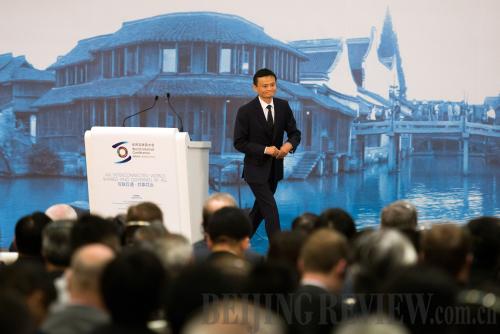 |
|
WEB ADDRESS: Jack Ma, Chairman of Alibaba Group, finishes delivering a speech at the World Internet Conference on November 19 (CFP) |
In April, two decades ago, Hu Qiheng, then Vice President of the Chinese Academy of Sciences, flew to the United States on a visit to the National Science Foundation, to whom he submitted China's request to access the Internet. On April 20 of that year, China was officially connected to the World Wide Web.
In 1996, Charles Zhang, then a fresh graduate of Stanford University, returned to Beijing to found the prototype of today's Sohu.com—the first Internet company sponsored by venture capital in China.
Now, China has 630 million Internet users, 1.2 billion cellphone users and 500 million microblogging and WeChat users who send a total of more than 20 billion messages every day, according to Lu.
Four of the top 10 Internet companies in the world are based in China, including Alibaba, Tencent, Baidu and JD.com.
After a successful debut on the New York Stock Exchange in September, Alibaba became the world's second largest Internet company after Google Inc.
Alibaba is the world's largest online retailer. In the third quarter of this year, the group recorded revenue of 16.8 billion yuan ($2.7 billion), up 53.7 percent from a year ago.
In recent years, November 11, dubbed Singles Day or Double Eleven, has been celebrated with online shopping sprees. This November 11, Alibaba received a total order of 57.1 billion yuan ($9.2 billion), up 58.6 percent from the previous year. Of all the orders, 42 percent were placed through cellphones.
"With the rapid popularization of smart terminals, lower service fees on telecommunication networks and increasingly complete coverage of Wi-Fi, Internet access via mobile phone has become the main impetus of the Internet development," stated the Statistical Report on Internet Development in China released by the China Internet Network Information Center in January.
According to the report, as of the end of 2013, the country had 500 million Internet mobile users, and among all the Internet users, the proportion of those using mobile phones to access the Internet rose to 81 percent.
The surge forward into using technology has not only facilitated the spread of the Internet throughout China but also generated more new applications, reconstructed the business mode of traditional industries and resulted in the rapid growth of the Internet economy.
The report also unveiled that users using Internet applications for online searching, shopping, payment and ticket booking were rising, whereas users browsing blogs and playing games were declining.
At the first WIC, Shen Yang, a professor with Tsinghua University, said that, with Weibo, WeChat, and Baidu, the face of new media has more and more Chinese characteristics.
Cyberspace governance
The Internet has fundamentally changed the way people live and work. It has facilitated communication and information gathering. Yang Kun, a Chinese native living in the United States, found that the Internet has shortened the distance between him and friends in China. He joined several WeChat groups initiated by his former classmates and colleagues in China. Every day, they chat about everything and share news, photos and videos. Although group members live in different cities, they feel as close as ever.
Chen Xin, a professor of history in Zhejiang University, told Xinhua News Agency that for nearly 20 years, he has communicated with scholars at home and abroad through e-mails, which have tremendously improved his research efficiency.
However, cyberspace, just as the physical world, is not a utopia. The Internet can spread valuable information as well as harmful viruses and misinformation. It can also be used as a tool for swindlers, hackers and even terrorists.
"The Internet is a double-edged sword. Used wisely, it is Alibaba's treasure trove; used unwisely, it is a Pandora's Box," remarked Ma Kai, Chinese Vice Premier, at the WIC on November 19.
